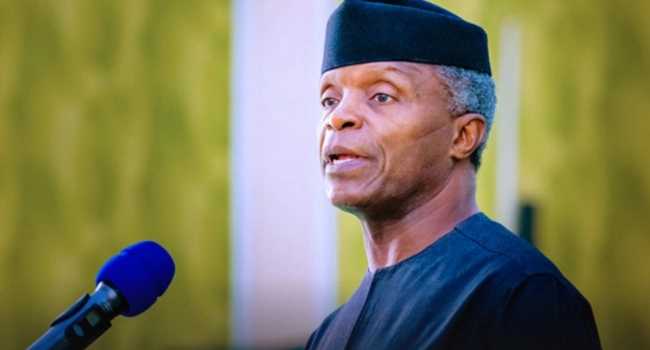By Asmau Ahmad
Nigeria’s Vice-President Yemi Osinbajo on Tuesday in Abuja inaugurated the 2021 Multiple Indicator Cluster Survey (MICS) and National Immunisation Coverage Survey (NICS) Report.
The National Bureau of Statistics (NBS) implemented MICS in 1995 aimed at providing data on child mortality, health, nutrition, education, child and social protection, women’s health care and empowerment, water, sanitation and hygiene.
While NICS assesses vaccination coverage provided through the health systems.
Represented by the Minister of Finance, Budget and National Planning, Dr Zainab Shamsuna Ahmed, said the survey was a comprehensive household survey also designed to track socio-economic activities as it affects the entire population.
The vice-president said the present administration had continued to make efforts to ensure the gaps reported in the last MICS survey in 2016 were addressed.
He said this had led to massive investment in the health care sector with particular emphasis on primary health care delivery and immunisation coverage.
Osinbajo said there had been evident improvement in the immunisation coverage from 34 per cent in 2016 to 57 per cent as reported in the current survey of 2021.
Prince Semiu Adeniran,the Statistician-General of the Federation, said the 2021 MICS/NICS report provided evidence-based data for all key stakeholders to prioritise quality services for children and women with higher efficiency and effectiveness.
Adeniran said the survey served as a major source of data for assessing the implementation of the SDGs, with over 20 per cent of the indicators required for tacking the SDGs being sources from the exercise.
He said that the first round of the survey was conducted in 1995 and each round had come with new improvements and innovations, which had brought about excitement to the producers and users of the data.
According to him, this round of survey, which has more than 200 indicators, recorded the highest response rate in the MICS series, recording an impressive response rate of 99 per cent.
Peter Hawkins, UNICEF Representative in Nigeria, said the MICS/NICS data would help Nigeria better assess the progress of its global and regional commitments which seek to promote the welfare of women and children.
According to him, the picture is a mixed one with some good progress that we should celebrate but we still have a long way to go toward ensuring the well-being of children in Nigeria.
Hawkins said the report revealed that child mortality had decreased from one in eight children in 2016 dying before their fifth birthday to one in 10 children.
He said there had also been significant progress in exclusive breastfeeding and birth registration rates. The exclusive breastfeeding rate doubled from 17 per cent to 34 per cent.
“While 57 per cent of Nigerian children under the age of five have their births registered with civil authorities, compared to 47 per cent in 2016.
In addition, he said child marriage by women married before age 18, had dropped from 44 per cent to 30 per cent since 2016.
He said the report showed child marriage was about four times higher in rural areas than in urban areas.
The Executive Director, National Primary Health Care Development Agency, Faisal Shuaib, said the challenge of adequate human resources needed to be addressed at the primary health care level.
“For us to do better, we have to work to address the challenges as only 27 per cent of our primary healthcare centres countrywide have the wide complement of human resources.
“We cannot jump to 80 per cent or 90 per cent until we address this. We must engage with our governors and local government chairmen to address the issue of human resources at the primary health care level.”


